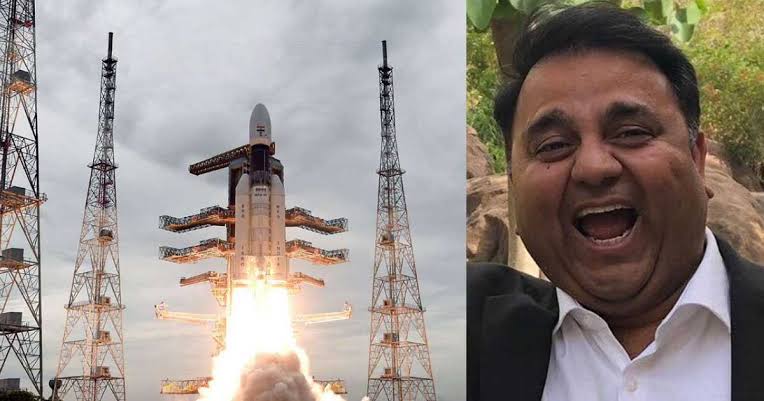Former Pakistani Minister of Science and Technology, Fawad Chaudhry, has made light-hearted remarks about India’s moon mission, stating that there was no need to go to such great lengths for moon sightings. His humorous response came in the context of a question about Moon sightings and India’s space mission conducted by ISRO (Indian Space Research Organisation). The video of his remark, “Itne papad belne ki zaroorat nahin hai,” meaning “You don’t need to go to such great lengths for Moon sightings,” quickly went viral and entertained viewers worldwide.
Chaudhry’s witty take on Moon sightings, particularly during the Islamic festival of Eid-ul-Fitr, resonated with many, especially considering India’s recent space mission. The tweet resurfaced and struck a chord with individuals who witnessed India’s latest endeavor into space.
On July 14, ISRO successfully launched Chandrayaan 3, the third edition of its lunar exploration program, from the Satish Dhawan Space Centre, Sriharikota. The mission aims to achieve a soft landing on the unexplored south pole of the Moon, making India one of the few countries to accomplish such a feat. As of now, only the United States, China, and Russia have managed to land on the lunar surface.
The spacecraft’s journey from Earth to the Moon is estimated to take about a month, with the landing expected on August 23. Once landed, it will operate for one lunar day, equivalent to approximately 14 Earth days, highlighting the different durations of days on the Moon compared to Earth.
Notably, in 2019, Fawad Chaudhry had announced Pakistan’s plan to send its first manned mission in 2022. Pakistan’s space agency, the Space & Upper Atmosphere Research Commission (SUPARCO), was established in 1961. While it had limited activity until the 1990s, it has been working on its 2040 space program to catch up with its Indian and Chinese counterparts, including launching more satellites through international collaborations.
Fawad Chaudhry’s playful jab at India’s moon mission has added a touch of humor to the realm of space exploration, showcasing the lighthearted banter that can often emerge between neighboring countries. Despite the jest, India’s Chandrayaan 3 represents a significant step forward in the nation’s space ambitions. By aiming for a soft landing on the Moon’s unexplored south pole, India is pushing the boundaries of lunar exploration and contributing to our understanding of the lunar surface.
The success of Chandrayaan 3 will place India in an exclusive league of countries that have achieved lunar landings. Such missions not only enhance scientific knowledge but also demonstrate a nation’s technological prowess on the global stage. India’s strides in space exploration have garnered international attention, and their achievements serve as an inspiration to other aspiring space-faring nations worldwide.
While India and Pakistan maintain a complex relationship, it is essential to recognize that both countries harbor their ambitions in space exploration. Pakistan’s plans to send its first manned mission in 2022 indicate its determination to make progress in this field. The establishment of SUPARCO in 1961 reflects Pakistan’s long-standing interest in space activities, and its current focus on a 2040 space program underscores its commitment to catching up with other spacefaring nations.
Space exploration fosters not only scientific advancement but also international collaboration. The study of space offers unique opportunities for countries to work together on mutually beneficial projects, contributing to peaceful cooperation and understanding between nations. By engaging in space missions, countries can share resources, knowledge, and expertise, leading to the advancement of space technology for all of humanity.
As India’s Chandrayaan 3 embarks on its lunar journey, the world will be eagerly watching its progress. The mission’s success will further enrich our knowledge of the Moon and pave the way for future space exploration endeavors. Meanwhile, Pakistan’s continued efforts to bolster its space program demonstrate the determination of countries in the region to play a more active role in space research and exploration.
In the grand scheme of things, space exploration transcends national borders, reminding us that we are all inhabitants of this pale blue dot called Earth. As we reach for the stars and explore the cosmos, the significance of international cooperation and peaceful exploration becomes increasingly evident, uniting humanity in its quest to unlock the mysteries of the universe.





 Government Intensifies Crackdown, Blocks Over 43 Illegal Loan Apps
Government Intensifies Crackdown, Blocks Over 43 Illegal Loan Apps